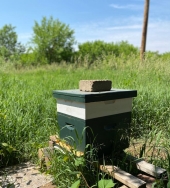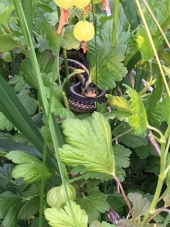




Tony Hillel wrote:That's good. If possible, take the drive and go pick them up if it's a reasonable distance away. You will have better success and very few dead bees if you can get them housed within a few hours.
Do you have nuc boxes for them? Small colonies do better in smaller spaces. Took me awhile to figure this out. My splits that are housed in a nuc box with supers on top regularly outperform ones put in a full size box. I think they like the chimney configuration, but whatever the case, the proof is in the results.
I made some of the Coates nucs out of 1/2" plywood, and they are great in the summer, but I like a full 3/4" plywood nuc wrapped in insulation in the winter and springtime when temps can still drop at night.
I hope your hives are very successful.

Tony Hillel wrote:I recommend that you go on the Beesource forum and ask who is local to you and buy from them. Sometimes, a beek has to make a split to prevent swarming, and will give the bees away if you have a hive to put them in.
But local bees are often the best, as long as they are good-tempered bees.

Hans Quistorff wrote:If you simply wont the bees for pollination rather than getting into honey production consider solitary bees. These are shipped in there dormant state when they are less apt to suffer shipping loss.
Two types are available. Mason bees which start working in early spring before honey bees become effective pollinators and leaf cutter bees that pollinate during hot summer weather.
Both are available from Crown Bees which is local to me here in Washington State.
They have the materials and instructions on their site and are good mentors for solitary bee pollination.
Another alternative is bumble bees that take very little maintenance. webpage Natupol Bumblebee Hives.
For honey bees it is best to join a local group. Search for apiarist near me. Directory

Michael Cox wrote:Impossible to answer this without more information:
Where are you?
What do you require from your bees?
What is your beekeeping experience, and what equipment will you be using?
Shipping bees is always problematic - especially across climate zones. People routinely ship packages from the warmer southern states of the US, who thrive for a season but don't do well over winter.
Personally I would advise that you approach beekeeper local to you, and see if someone will sell you a nucleus colony - rather than a package. You can also look into getting bees from stock with a known heritage of varroa resistance.



 I don't mention children in my post because mine is grown (22). Unfortunately, by the time I get to that point in my next serious relationship where it would make sense to consider children, it will be too risky and/or difficult for me to conceive/carry a biological child. I wish you the best of luck finding your special someone, though.
I don't mention children in my post because mine is grown (22). Unfortunately, by the time I get to that point in my next serious relationship where it would make sense to consider children, it will be too risky and/or difficult for me to conceive/carry a biological child. I wish you the best of luck finding your special someone, though. 
